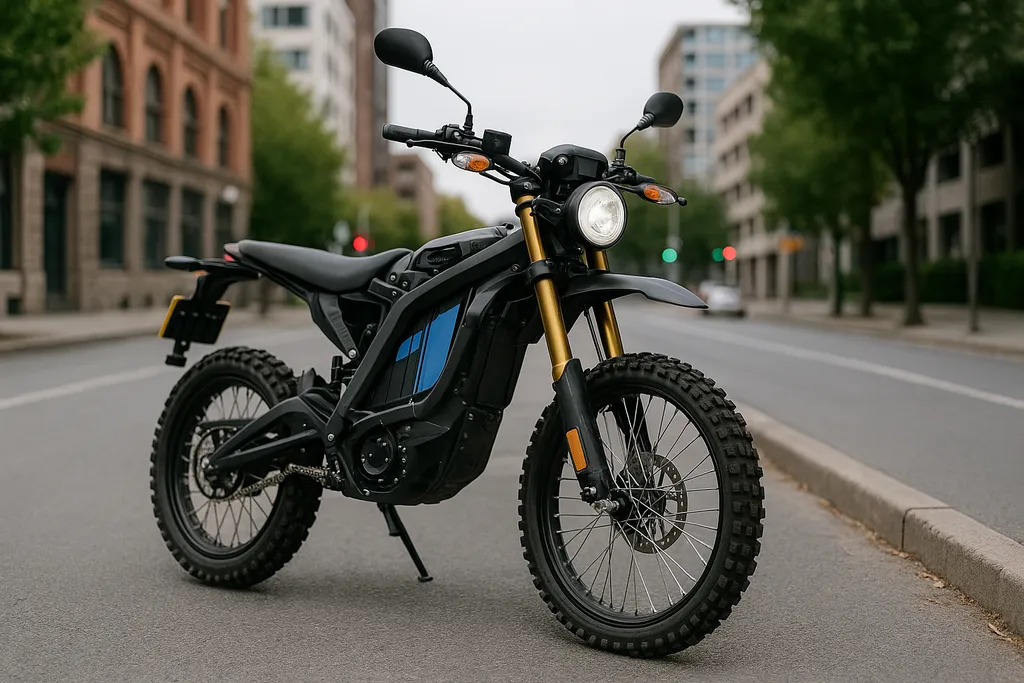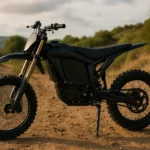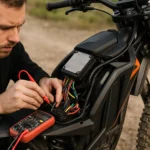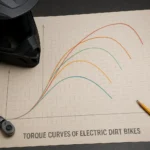Electric dirt bikes like the Sur Ron are gaining serious popularity — but one big question keeps popping up in forums, social media, and even in our DMs: Is the Sur Ron street legal?
If you’re thinking about cruising the streets with your Sur Ron or you’re a parent wondering if your teen can legally ride it around the neighborhood, this guide is for you.
We’ll break it all down so you can stay informed, stay safe, and stay legal. Let’s roll! ⚙️
Key Takeaways
- The Sur Ron is not street legal by default — it’s designed for off-road fun.
- Street legality varies depending on your state or city.
- You can make it legal with the right mods and paperwork.
- We’ll show you what you need: from DOT tires to turn signals.
- Avoid legal trouble and fines by following this step-by-step guide.
⚠️ Need a specific answer fast? Use the quick jump links below to go straight to the info you care about 👇
What Does “Street Legal” Actually Mean?
Before we dive into the nitty-gritty of the Sur Ron, let’s clear up one thing first — what does “street legal” actually mean?
In the U.S., for any vehicle to be considered street legal, it must meet specific safety and regulatory standards set by the Department of Transportation (DOT) and local DMV laws.
Basic Requirements in the U.S.
To ride legally on public roads, your Sur Ron (or any bike) typically needs:
- A headlight with high and low beams
- A taillight and functioning brake light
- Turn signals (front and rear)
- At least one mirror (most states require a left-side mirror)
- A working horn
- DOT-approved tires
- A license plate bracket with illumination
- A speedometer (in some states)
- And most importantly: VIN, registration, and insurance
These requirements might sound like a lot, but they’re meant to keep both riders and others on the road safe. And yep — most of these parts don’t come standard on your Sur Ron.
Why Sur Rons Don’t Come Street Legal by Default
Here’s the deal — Sur Rons are built for trails, hills, and everything off the beaten path.
The factory version isn’t equipped with all the street hardware because it’s technically classified as an “off-highway vehicle”. That means no turn signals, no plates, and no DOT tires out of the box.
Plus, every state treats these bikes a bit differently. Some allow easier modifications and registration, others won’t touch it unless it’s already built to spec.
Bottom line? You can’t assume your Sur Ron is legal just because it’s electric.
We’re just getting started — next up, let’s compare the most popular Sur Ron models and see which ones stand a chance of hitting the streets (legally, of course).
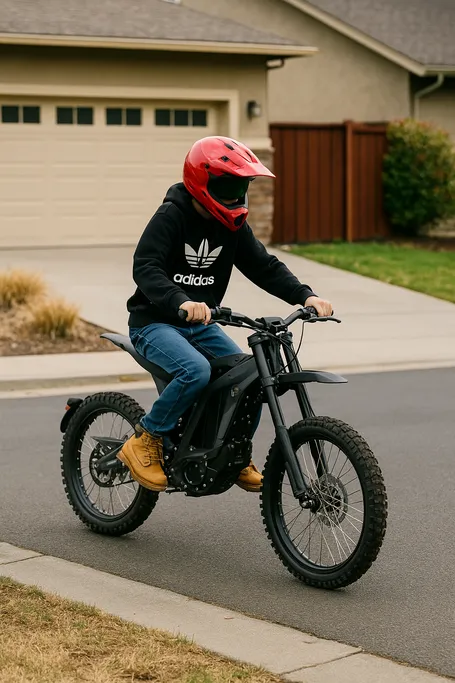
Sur Ron Models: Which Ones Can Be Made Street Legal?
Not all Sur Rons are created equal — especially when it comes to street legality.
Some models are easier to convert than others, depending on their stock features and intended use. Let’s break down the two most talked-about models in the community and see how they stack up.
Sur Ron X — The Off-Road Beast
The Sur Ron X is the most popular version, and it’s easy to see why: it’s lightweight, torquey, and built for adventure. But when it comes to riding on public roads… it’s a no-go out of the box.
It lacks DOT-compliant parts, doesn’t have a VIN recognized by many DMVs, and needs serious upgrades to meet street standards.
That said, thousands of riders have made it street legal — it just takes time, a good parts list, and patience dealing with local regulations.
Key takeaway: It’s possible to legalize the Sur Ron X, but expect a full mod list and a DMV dance.
Sur Ron Storm Bee — Closer to Street Ready?
The Storm Bee is a whole different beast. It’s bigger, heavier, and more powerful — basically the grown-up sibling of the Sur Ron X.
The best part? It comes with more road-ready features, like turn signals, mirrors, and a full-size frame closer to traditional motorcycles.
While still not fully street legal from the factory, the Storm Bee often faces fewer legal obstacles when registering, especially in states that allow dual-sport conversions.
Comparison Table
| Model | Street Legal Out of Box | Can Be Made Legal? | Best Use |
|---|---|---|---|
| Sur Ron X | ❌ | ✅ With Mods | Off-Road Focused |
| Storm Bee | ❌ | ✅ Easier Conversion | Mixed Use |
Legal Requirements By State (With Examples)
Here’s where things get tricky — street legality isn’t the same across the U.S.
Each state has its own rules, paperwork, and patience level when it comes to Sur Ron registration.
Let’s take a look at three key examples so you know what to expect.
California
If you live in Cali, brace yourself — the state has some of the strictest vehicle laws in the country.
To register a Sur Ron, you’ll need a complete list of DOT parts, a valid VIN, and a full inspection at the DMV.
Even then, approval isn’t guaranteed.
You can check the official list of motorcycle requirements directly from the California DMV ✅ (EXTERNAL LINK)
Some riders go the moped route, but that’s a legal gray zone and often rejected.
Bottom line: in California, it’s tough but not impossible — just don’t skip the paperwork.
Texas
Everything’s bigger in Texas — including your chances of legalizing your Sur Ron.
The state is generally more flexible, especially if your mods are clean and you go through the proper channels.
Some counties even allow “home-built” or “custom” titles.
As long as your Sur Ron has working lights, mirrors, horn, DOT tires, and a clean inspection, you can usually get it registered.
Pro tip: You’ll likely need insurance and a motorcycle license if you’re planning full road use.
New York
New York plays by its own rules. Some riders get away by registering as Class C mopeds, but it depends on your exact model and how the DMV classifies it.
You’ll need:
- A visible VIN
- Proof of ownership
- DOT-compliant parts
- A moped/motorcycle inspection depending on speed
Expect more red tape than Texas, but less resistance than California in some boroughs.
🛑 Want the full breakdown on electric dirt bike laws across the country?
Check out our ultimate guide to street legal electric dirt bikes for all 50 states.
What Mods Are Needed to Make a Sur Ron Street Legal?
If your Sur Ron still looks like it just came off a trail, it’s time to gear it up for the streets.
To pass inspections and ride legally, you’ll need to add some key upgrades.
Let’s break it down by category.
Lights & Electrical
This is the most important group of mods — and the most visible.
You’ll need:
- Headlight with high/low beam (DOT-approved)
- Tail light and brake light (often sold together in a kit)
- Turn signals (front and rear, with working switch)
These parts must be bright enough for street use and wired properly into the Sur Ron’s battery.
Most riders go with plug-and-play lighting kits, but some prefer to DIY.
Mirrors, Horn & Plate Bracket
These may seem minor, but they’re required in almost every state.
- At least one mirror (left side required in most areas)
- A horn (electric, not just a bell or buzzer)
- A license plate holder with light for visibility at night
Skipping any of these can get your registration denied. So yeah — don’t skimp.
Tires, Speedometer & VIN
Off-road tires are cool, but not street legal.
You’ll need:
- DOT-rated tires for pavement traction and legal compliance
- A speedometer (digital or analog — many states require it)
- A visible VIN number for registration and inspection
Some Sur Rons don’t have a VIN recognized by the DMV.
In that case, you may need a state-issued VIN assignment — ask your local DMV for details.
Coming up next: how much all these mods will cost you, and if it’s really worth doing the full conversion.
Cost Breakdown: Making Your Sur Ron Legal
Now that you know what mods are required, let’s talk numbers.
Turning your Sur Ron into a street-legal machine isn’t free — but it’s not outrageous either.
Here’s a realistic look at what you’ll likely spend.
Estimated Budget Table
| Item | Estimated Cost |
|---|---|
| Lights & Indicators Kit | $120–$250 |
| Mirror + Horn | $30–$50 |
| DOT Tires (pair) | $80–$150 |
| License Plate Bracket | $20–$40 |
| Speedometer | $40–$100 |
| Registration & Title | Varies by state |
| Labor (if outsourced) | $100–$300 (optional) |
These prices vary based on the parts you choose and whether you install everything yourself.
You can find most parts online or at local powersport shops.
Some shops even offer pre-made street legal kits that bundle everything.
Is It Worth It?
That depends on how and where you plan to ride.
If you’re looking to:
- Commute in the city
- Cruise around your neighborhood
- Ride legally without hassle from cops
Then yes — the conversion is definitely worth it.
But if you’re sticking to trails and private land, you might skip the whole process.
Still, it’s good to know what it takes if you change your mind later.
Real Stories From the Community
Want to know what it’s really like to make a Sur Ron street legal?
Here’s what some of our readers have shared after going through the process themselves.
Jake from Texas
“I made my Sur Ron X street legal in under a week. Best decision ever.
I ordered a full kit online, took it to a local shop, and passed inspection no problem.
I ride it to work every day — and get questions about it nonstop!”
Jake’s experience shows how smooth the process can be when your state is friendly and you’re well prepared.
Sarah from Oregon
“I tried to legalize my Storm Bee and hit a wall.
The DMV didn’t recognize the VIN, and I couldn’t get a clear answer from anyone.
After two visits and a bunch of paperwork, I gave up.”
Sarah’s case is a reminder that not every state plays nice, especially with non-standard VINs or newer electric models.
Each state has its own vibe — make sure to call ahead and understand your local laws before you start the process.
FAQs
Is the Sur Ron street legal without any mods?
No. Out of the box, the Sur Ron is not street legal.
It’s sold as an off-road bike and lacks all the required equipment for road use.
Can I register a Sur Ron as a moped?
In some states, yes — but it depends on speed limits, classification, and DMV rules.
Most Sur Rons exceed the top speed allowed for mopeds.
Will insurance cover a Sur Ron?
Only if it’s registered and meets your state’s legal requirements.
Without proper registration, most insurers won’t touch it.
Do I need a license to ride a Sur Ron on the road?
Yes. If you legalize it, you’ll typically need a motorcycle license or moped license, depending on your state.
Can cops seize my Sur Ron if it’s not legal?
Absolutely. Riding an unregistered vehicle on public roads can lead to fines, impoundment, and sometimes even court dates.
Share Your Ride With the Community! 💬
Have you made your Sur Ron street legal? Thinking about it?
We’d love to hear your story — whether it was smooth sailing or a DMV nightmare.
Drop a comment below, or tag us on social media to show off your custom setup!
📢 Know someone thinking of legalizing their Sur Ron?
Share this post with them — it might save them hours of research (and a few headaches).
👉 Oh, and don’t forget — we’ve got the ultimate breakdown for all electric dirt bike street legality in the U.S.
Check it out here: Are Electric Dirt Bikes Street Legal?
Let’s keep helping each other ride smarter, safer, and stronger. ⚡

Tyler Brooks is the storyteller behind most of the content at Electric Dirt Zone. With over 10 years of experience in digital media and a lifelong love for off-road riding, he blends technical insight from the team with engaging, down-to-earth writing. When he’s not turning dusty trail rides into blog posts, you’ll probably find him snapping pics before things get too wild.

